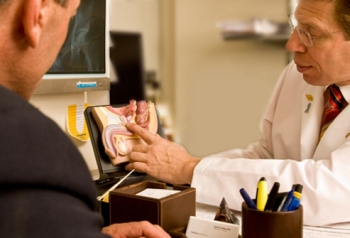Prostate Tips for the Elderly


Did you know that 1 in 6 men over the age of 60 will be diagnosed with a prostate complication? And 1 in 3 men will complain of urinary trouble owing to a growing prostate. This small walnut-shaped gland produces a fluid that nourishes the sperm, which makes it a vital part of the male reproductive system. When it undergoes a growth spurt, it presses up against the bladder and squeezes the urethra, invariably causing urinary discomfort, which can be a cause for extreme embarrassment and anxiety for most men. There’s nothing you can do to stop this growth, because advancing age and heredity are the two biggest risk factors for a growing prostate. But here are some tips that can ease away some of your discomfort and make life a lot more comfortable.
Prostate Tips for the Elderly
- Follow a healthy diet. Provide your body with all the essential vitamins, minerals, and antioxidants by eating fruits and vegetables. The prostate prefers brightly colored veggies! So make friends with tomatoes, cranberries, watermelon, pink grapefruit, red and yellow pepper, broccoli, collard greens etc. Limit the consumption of saturated fat by choosing lean meat over red meat. Soy is another food group that reinstates hormonal balance and is very prostate-friendly. Studies have reported that eating fresh fruits, vegetables, and whole grains, and cutting down on processed food, animal products, and fast food substantially lowers the risk of prostate disease.
- Use supplementation. Super Beta Prostate testimonials state that this quality prostate supplement contains Beta Sitosterol and other important nutrients in the right proportions to keep the prostate healthy. The chief ingredient is a plant sterol that effectively reduces swelling and eases urinary discomfort.To get an idea of the severity of symptoms associated with a growing prostate, read a Super Beta Prostate supplement review.
- Drink lots of water and fresh fruit juices. Minimize the intake of caffeinated drinks. Avoid drinking water and other fluids a couple of hours before bedtime to reduce frequent urination at night.
- Exercise regularly. A few minutes of moderate exercises reduces the risk of heart and prostate disease and enhances the body’s defense mechanism.
- Overweight people are more prone to prostate health disorders. Keep your weight in check by eating a low fat diet and daily workouts.
- Limit the consumption of alcohol.
- Give up smoking.
- Do Kegel exercises. They ensure better blood circulation to the pelvic region and help men to achieve better urinary flow control by strengthening the bladder and urethra muscles.
- Making love is said to be beneficial for prostate health. Ejaculation removes the toxic fluid buildup inside the urethra and improves prostate health.
Prostate growth is a very common problem faced by plenty of men. Read all that you can about it so you know what exactly needs to be done if you’re faced with such a problem. Frequent urination is the most obvious sign of a prostate disorder. Don’t hesitate to seek medical advice and follow up with your doctor for an yearly prostate exam to detect and manage any abnormality at its initial stage.
